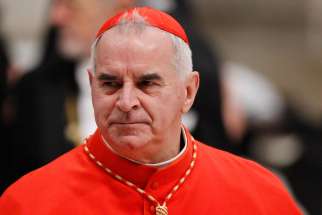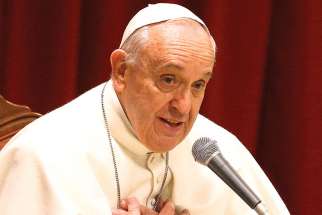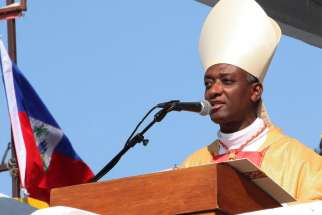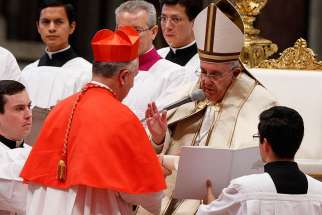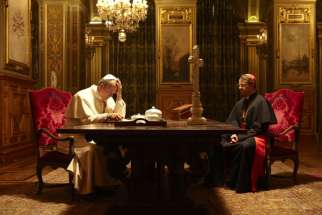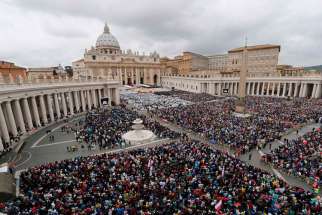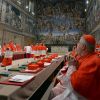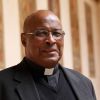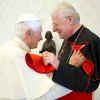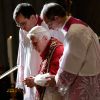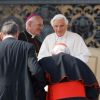VATICAN CITY - Pope Francis accepted Scotland Cardinal Keith O'Brien's decision to renounce all "duties and privileges" associated with being a cardinal.
Francis’ reforms run into strong headwinds
VATICAN CITY - One reason the cardinals gathered in the Sistine Chapel elected Jorge Mario Bergoglio as Pope Francis two years ago was a brief but powerful speech the Argentine cardinal made shortly before the conclave in which he denounced the “theological narcissism” of the Roman Catholic Church.
WASHINGTON - Cardinal Chibly Langlois of Les Cayes, Haiti, charged that police have failed to protect religious and priests who have faced a growing number of break-ins, robberies and attacks, including rape.
Becoming a cardinal is a call to greater love, patience, Pope says
VATICAN CITY - In a Valentine's Day ceremony to create 20 new cardinals, Pope Francis offered a meditation on Christian love and, especially, what it means for those who guide and minister in the church.
In the era in which Catholics saw their first Polish pope, the Church in France saw its first Jewish cardinal.
Vatican says bureaucratic reforms won’t happen until 2015
VATICAN CITY - Pope Francis and his council of eight cardinals are unlikely to complete a radical shakeup of the Holy See’s administration, or Curia, before 2015, the Vatican said Tuesday (April 29).
VATICAN CITY - While the cardinal electors were intensely praying and choosing the next pope, they were utterly unaware of the huge crowds waiting outside braving the rain and whether the smoke really worked, said Cardinal Timothy M. Dolan of New York.
VATICAN CITY - Cardinal-electors are caught in a Catch-22. They are eager to give the world a new pope; however, they need time to pick the right leader, said South Africa's cardinal.
12 to watch as cardinals gather in Rome
VATICAN CITY - Wherever journalists and bookmakers may be getting the names on their lists of top candidates for the next pope, it’s not from the cardinals who will actually vote in the election. Both custom and canon law forbid the cardinals to discuss the matter in such detail with outsiders.
Celebrating Church's universality, Pope creates new cardinals
VATICAN CITY (CNS) -- Recalling that Christ's mission transcends "all ethnic, national and religious particularities," Pope Benedict XVI created six new cardinals from four different continents, representing the Latin rite of the Catholic Church as well as two Eastern Catholic Churches.
Truly universal Church
When Pius XII became Pope in 1939 the college of cardinals had token representation from Latin and North America, one cardinal from the Middle East and none from the rest of Asia or from Africa. It was 89 per cent European.
By the time Pius died in 1958, the college had welcomed cardinals from Africa, India and China, Latin American representation had tripled and European membership was just 64 per cent of the total. The internationalization of the Vatican had begun.
But the journey has been slow since then even though European Catholics as a percentage of the worldwide Church have been in steady decline, if not outright free fall. So it was welcomed news last month when Pope Benedict announced a “little-consistory” for Nov. 24 to create six new cardinals who come from six non-European countries.
In doing so, history of sorts is being made. This is the first consistory in a thousand years of cardinal making in which Europe and North America are outnumbered by new cardinals from the developing world. In addition to one American, red hats are going to bishops from Lebanon, India, Nigeria, Colombia and the Philippines. Together they reflect the changing face of a Church in which two-thirds (and growing) of its members live in Africa, Asia and Latin America.
The Church continues to evolve. Announcing the consistory last month, Pope Benedict called it recognition that “the Church belongs to all peoples, speaks all languages.” In a reference to Europe, he said the consistory confirms “it is not the Church of one continent but a universal Church.”
Last February, the Pope added 18 new elector cardinals at a consistory that raised eyebrows for being European-heavy, naming just three new cardinals from the developing world. Africa, despite having the world’s fastest growing Catholic population, was completely shut out. Adding five non-Westerners now doesn’t even things out but it puts a welcomed dent in the imbalance and foreshadows the future.
The newest cardinals are relatively young. Two are in their 50s, the oldest is 73 and the average age is 63. In addition to helping select future popes, they will sit on various Vatican committees and exert influence for many years to come.
Also, these additions bring the college to its full complement of 120 electors for a new pope, and lowers European votes to 51 per cent of the total. That’s not much different from when Benedict became Pope in 2005. What continues to change, however, is the demography of the world’s one billion Catholics. The Church is projected to be 75 per cent non-Western within the lifetime of many of the new cardinals.
How that impacts the Church will be watched closely, particularly so for the papacy, an institution that has been mostly Italian and always European for the last 12 centuries.
Pope names six new cardinals
VATICAN CITY - Pope Benedict XVI surprised pilgrims in St. Peter's Square Oct. 24 by announcing he would create six new cardinals in late November.
The Pope said the consistory to create the new cardinals, who come from six countries, would take place Nov. 24, the feast of Christ the King.
It will be the smallest group of cardinals created since the 1977 consistory when Pope Benedict, the then-Archbishop Joseph Ratzinger, received his red hat from Pope Paul VI along with three other churchmen.
The new cardinals will include: 63-year-old U.S. Archbishop James Harvey, prefect of the papal household; Lebanon's Maronite Patriarch Bechara Rai, 72; Archbishop Baselios Cleemis Thottunkal, 53, head of the Syro-Malankara Catholic Church; Nigerian Archbishop John Olorunfemi Onaiyekan of Abuja, 68; Colombian Archbishop Ruben Salazar Gomez of Bogota, 70; and Philippine Archbishop Luis Tagle of Manila, 55.
Pope Benedict made the announcement at the end of his weekly general audience, which was attended by about 20,000 pilgrims. As is usual, Cardinal-designate Harvey was seated next to the Pope during the audience. While he did not visibly react when his name was announced, the new cardinal-designate smiled and had a brief moment with the Pope before returning to his normal duties of helping lead important guests up to the Pope.
Telling the crowd that he had the "great joy" of announcing new cardinals, Pope Benedict said cardinals have "the task of helping the successor of Peter in his ministry" of strengthening people's faith and promoting the unity of the Church.
The Pope asked Catholics to pray that the new cardinals would "always love Christ and His Church with courage and dedication."
Of the six soon-to-be cardinals, only Cardinal-designates Harvey and Salazar were not members of the world Synod of Bishops on the new evangelization, which was meeting at the Vatican when the Pope made his announcement.
The late-November consistory will bring the total number of cardinals to 211 and the number of cardinals under age 80 to 120. Until they reach their 80th birthdays, cardinals are eligible to vote in a conclave to elect a new pope.


